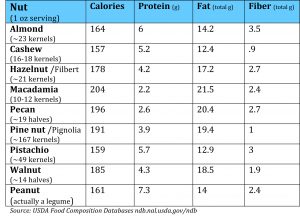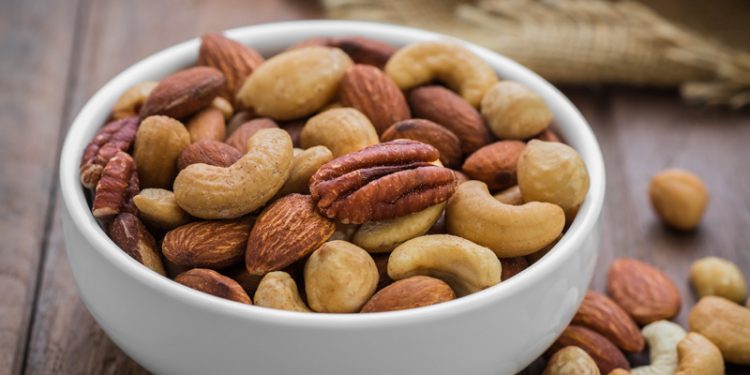Adding nuts to your diet can boost your health!
Nuts are a composite of a seed and dry fruit surrounded by a hard outer shell. They are a nutrient dense food rich in heart healthy fats, vegetable protein, soluble fiber, vitamins, minerals, tocopherols, phytosterols and phenolic compounds.
They are a go-to food source for all nutrition coaches looking to help their clients lead healthy lives.
Nut Nutrients (In A Nutshell)
- Monounsaturated fatty acids (MUFA)
- Omega-3 essential fatty acids (ALA)
- Polyphenolic flavonoid antioxidants such as carotenes, resveratrol, lutein and cryptoxanthin
- Vitamins, including B complex and E
- Minerals, including manganese, potassium, calcium, iron, magnesium, zinc, fluoride and selenium
- Fiber (about 2.3 g/ ¼ cup)
- Protein (about 6.7 g/ ¼ cup)
Due to their unique composition of macro, micro and phyto nutrients, nuts have been shown to have a number of health promoting benefits.
An Ounce of Nuts Is Equal To A Pound of Prevention (And Cure)

Numerous studies have shown a positive correlation between nut consumption and a reduced incidence of coronary heart disease, gallstones, diabetes, hypertension, cancer, metabolic syndrome and oxidative stress. In addition, consuming nuts has a cholesterol-lowering effect. Regular nut consumption (approx. ¼ cup) is unlikely to cause weight gain or contribute to obesity. In fact, nuts have been shown to lower body weight and fat mass. (Blomhoff, R., et al. 2006) (Rajaram, S., & Sabaté, J. 2006) (Ros, E. 2010) (Sabaté, J., & Ang, Y. 2009)
When it comes to nutrient density, almonds are the highest in protein, fiber, calcium, vitamin E (alpha-tocopherol), riboflavin and niacin. Among tree nuts, they are the best source of six of the 13 nutrients for which there are DVs/DRVs and among the lowest in calories.
Mixed, raw and unsalted nuts provide the best variety of nutrients and antioxidants.
For some great information on the health benefits of almonds, follow the link for additional content.
Dose: Let Food Be Thy Medicine
Patients with metabolic syndrome (elevated serum lipids, insulin resistance, and inflammatory biomarkers) show improvements after daily intake of 30 g of mixed nuts.
(Casas-Agustench, P., Let al. 2011)
Raw vs Oil Roasted With Salt, etc.
Oil roasted nuts with added salt have a higher calorie, fat (usually omega 6 and/or trans fats) and sodium content, which could lead to an increased risk of obesity, high cholesterol, heart disease, hypertension and inflammation. Many trail mixes contain added oils, salt, sugar and gluten. Read the label and try to avoid these.
Nut Allergies
The most common nut allergies include: peanuts (53%), pecan (26%), almond (25%), walnut (22%), cashew (16%), pistachio and Brazil nut (10%), hazelnut and macadamia nut (9%), and pine nut (6%). Overall, the estimated prevalence of peanut and/or tree nut allergies is about 1.4% While reactions can vary, those with known nut allergies should avoid nut consumption.
(Eigenmann, P. A., et al. 2017)
Culinary Uses of Nuts
- Nuts and seeds are versatile and can be eaten raw, roasted, salted or sweetened
- Sprinkled over desserts
- Added to smoothies (raw or in nut butter form)
- Added to bread, muffins, and other baked goods
- Nutritious butter in a sandwich, spread on fruit or as a quick snack by itself
- As a healthy alternative to breading chicken or fish
Dr. Geoff’s Power Trail Mix (Combine the following, or some combination based on your preference)
- ½ cup organic raw almonds
- ½ cup organic raw macadamia nuts
- ½ cup organic raw pecans
- ½ cup organic raw pumpkin seeds
- ½ cup organic raw walnuts
- ½ cup organic raw pistachios
- ½ cup shredded organic coconut
- ½ cup organic chocolate chips (70% or greater cacao content)
- ½ cup goji berries
-Store in a glass container in a cool, dark place
-Nuts can also be toasted on low heat in a toaster oven- let them cool prior to mixing with the other Power Trail Mix ingredients.
-Recommended serving size: ¼-½ cup daily as a snack
References
Blomhoff, R., Carlsen, M. H., Andersen, L. F., & Jacobs, D. R. (2006). Health benefits of nuts: potential role of antioxidants. British Journal of Nutrition, 96(S2), S52-S60.
Casas-Agustench, P., López-Uriarte, P., Bulló, M., Ros, E., Cabré-Vila, J. J., & Salas-Salvadó, J. (2011). Effects of one serving of mixed nuts on serum lipids, insulin resistance and inflammatory markers in patients with the metabolic syndrome. Nutrition, metabolism and cardiovascular diseases, 21(2), 126-135.
Eigenmann, P. A., Lack, G., Mazon, A., Nieto, A., Haddad, D., Brough, H. A., & Caubet, J. C. (2017). Managing nut allergy: a remaining clinical challenge. The Journal of Allergy and Clinical Immunology: In Practice, 5(2), 296-300.
Rajaram, S., & Sabaté, J. (2006). Nuts, body weight and insulin resistance. British Journal of Nutrition, 96(S2), S79-S86.
Ros, E. (2010). Health benefits of nut consumption. Nutrients, 2(7), 652-682.
Sabaté, J., & Ang, Y. (2009). Nuts and health outcomes: new epidemiologic evidence. The American journal of clinical nutrition, 89(5), 1643S-1648S.
















